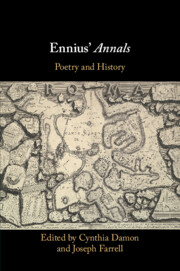Book contents
- Ennius’ Annals
- Ennius’ Annals
- Copyright page
- Dedication
- Contents
- Contributors
- Abbreviations
- Introduction: History and Poetry in Ennius’ Annals
- I Innovation
- II Authority
- III Influence
- IV Interpretation
- Chapter 12 Ennius and Lucilius: Good Companion/Bad Companion
- Chapter 13 Ennius’ Annals as Historical Evidence in Ancient and Modern Commentaries
- Chapter 14 Commenting on the Annals: Steuart, Skutsch, and Ennius
- Afterword
- Works Cited
- General Index
- Index Locorum
Chapter 14 - Commenting on the Annals: Steuart, Skutsch, and Ennius
from IV - Interpretation
Published online by Cambridge University Press: 10 April 2020
- Ennius’ Annals
- Ennius’ Annals
- Copyright page
- Dedication
- Contents
- Contributors
- Abbreviations
- Introduction: History and Poetry in Ennius’ Annals
- I Innovation
- II Authority
- III Influence
- IV Interpretation
- Chapter 12 Ennius and Lucilius: Good Companion/Bad Companion
- Chapter 13 Ennius’ Annals as Historical Evidence in Ancient and Modern Commentaries
- Chapter 14 Commenting on the Annals: Steuart, Skutsch, and Ennius
- Afterword
- Works Cited
- General Index
- Index Locorum
Summary
This paper considers the various approaches one might take to commenting on a text as fragmentary as the Annals. I begin with some general remarks about fragments and look at their specific implications for Ennius. I then focus on some details from the two English language commentaries on the Annals to date, those of Otto Skutsch and his precursor, Ethel Mary Steuart. Comparing sample notes and larger structures in the two commentaries, showing how both commentators were seduced – to varying degrees – by a desire for completeness and copia, and how the poems that emerge from these commentaries differ. Though Steuart was rigorously trained in the same basic stable as Skutsch, her work is too far inferior – in accuracy and in sophistication of methodology – to his and to other available editions of the Annals to stand up against them. But it is also the work of a learned scholar with a different voice and a heterodox vision of the poem, a useful presence in a world where Skutsch’s Ennius may no longer be our Ennius.
Keywords
- Type
- Chapter
- Information
- Ennius' AnnalsPoetry and History, pp. 280 - 295Publisher: Cambridge University PressPrint publication year: 2020

